Chapter 22: Physical Development in Early Adulthood
Chapter 22 Learning Objectives
- Summarize the overall physical growth in early adulthood
- Describe statistics, possible causes, and consequences of obesity
- Explain how early adulthood is a healthy, yet risky time of life
- Identify the risk factors for substance use
- Describe the changes in brain maturation
- Describe gender in adulthood, including gender minorities and stress
- Define sexuality and explain the female and male reproductive systems
- Describe the brain areas and hormones responsible for sexual behavior
- Identify sexually transmitted infections
- Describe cultural views related to sexuality
- Describe research on sexual orientation
The Physiological Peak
People in their mid-twenties to mid-forties are considered to be in early adulthood. By the time we reach early adulthood, our physical maturation is complete, although our height and weight may increase slightly. Those in their early twenties are probably at the peak of their physiological development, including muscle strength, reaction time, sensory abilities, and cardiac functioning. The reproductive system, motor skills, strength, and lung capacity are all operating at their best. Most professional athletes are at the top of their game during this stage, and many women have children in the early-adulthood years (Boundless, 2016).
The aging process actually begins during early adulthood. Around the age of 30, many changes begin to occur in different parts of the body. For example, the lens of the eye starts to stiffen and thicken, resulting in changes in vision (usually affecting the ability to focus on close objects).
Sensitivity to sound decreases; this happens twice as quickly for men as for women. Hair can start to thin and become gray around the age of 35, although this may happen earlier for some individuals and later for others. The skin becomes drier and wrinkles start to appear by the end of early adulthood. This includes a decline in response time and the ability to recover quickly from physical exertion. The immune system also becomes less adept at fighting off illness, and reproductive capacity starts to decline (Boundless, 2016).
Obesity
Although at the peak of physical health, a concern for early adults is the current rate of obesity. Results from the National Center for Health Statistics indicated that an estimated 70.7% of U.S. adults aged 20 and over were overweight in 2012 (CDC, 2015b) and by 2016, 39.8% were considered obese (Hales, Carroll, Fryar, & Ogden, 2017)). Body mass index (BMI), expressed as weight in kilograms divided by height in meters squared (kg/m2), is commonly used to classify overweight (BMI 25.0–29.9), obesity (BMI greater than or equal to 30.0), and extreme obesity (BMI greater than or equal to 40.0). The current statistics are an increase from the 2013-2014 statistics that indicated that an estimated 35.1% were obese, and 6.4% extremely obese (Fryar, Carroll, & Ogden, 2014). The CDC also indicated that one’s 20s are the prime time to gain weight as the average person gains one to two pounds per year from early adulthood into middle adulthood. The average man in his 20s weighs around 185 pounds and by his 30s weighs approximately 200 pounds. The average American woman weighs 162 pounds in her 20s and 170 pounds in her 30s.
The American obesity crisis is also reflected worldwide (Wighton, 2016). In 2014, global obesity rates for men were measured at 10.8% and among women 14.9%. This translates to 266 million obese men and 375 million obese women in the world, and more people were identified as obese than underweight. Although obesity is seen throughout the world, more obese men and women live in China and the USA than in any other country. Figure 7.6 illustrates how waist circumference is also used as a measure of obesity. Figure 7.7 demonstrates the percentage growth for youth (2-19 years) and adults (20-60+ years) identified as obese between 1999 and 2016.
Figure 7.6
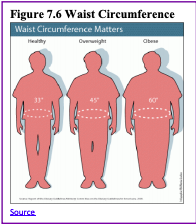
Causes of Obesity: According to the Centers for Disease Control and Prevention (CDC) (2016), obesity originates from a complex set of contributing factors, including one’s environment, behavior, and genetics. Societal factors include culture, education, food marketing and promotion, the quality of food, and the physical activity environment available. Behaviors leading to obesity include diet, the amount of physical activity, and medication use. Lastly, there does not appear to be a single gene responsible for obesity. Rather, research has identified variants in several genes that may contribute to obesity by increasing hunger and food intake. Another genetic explanation is the mismatch between today’s environment and “energy-thrifty genes” that multiplied in the distant past when food sources were unpredictable. The genes that helped our ancestors survive occasional famines are now being challenged by environments in which food is plentiful all the time. Overall, obesity most likely results from complex interactions among the environment and multiple genes.
Figure 7.7
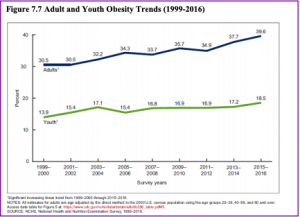
Obesity Health Consequences: Obesity is considered to be one of the leading causes of death in the United States and worldwide. Additionally, the medical care costs of obesity in the United States were estimated to be $147 billion in 2008. According to the CDC (2016) compared to those with a normal or healthy weight, people who are obese are at increased risk for many serious diseases and health conditions including:
- All-causes of death (mortality)
- High blood pressure (Hypertension)
- High LDL cholesterol, low HDL cholesterol, or high levels of triglycerides (Dyslipidemia)
- Type 2 diabetes
- Coronary heart disease
- Stroke
- Gallbladder disease
- Osteoarthritis (a breakdown of cartilage and bone within a joint)
- Sleep apnea and breathing problems
- Some cancers (endometrial, breast, colon, kidney, gallbladder, and liver)
- Low quality of life
- Mental illness, such as clinical depression, anxiety, and other mental disorders
- Body pain and difficulty with physical functioning
A Healthy, But Risky Time
Doctor’s visits are less frequent in early adulthood than for those in midlife and late adulthood and are necessitated primarily by injury and pregnancy (Berger, 2005). However, the top five causes of death in emerging and early adulthoods are non-intentional injury (including motor vehicle accidents), homicide, and suicide with cancer and heart disease completing the list (Heron, & Smith, 2007). Rates of violent death (homicide, suicide, and accidents) are highest among young adult males and vary by race and ethnicity. Rates of violent death are higher in the United States than in Canada, Mexico, Japan, and other selected countries. Males are 3 times more likely to die in auto accidents than are females (Frieden, 2011).
Alcohol Abuse: A significant contributing factor to risky behavior is alcohol. According to 2014, National Survey on Drug Use and Health (National Institute on Alcohol Abuse and Alcoholism (NIAAA), 2016) 88% of people ages 18 or older reported that they drank alcohol at some point in their lifetime; 71% reported that they drank in the past year, and 57% reported drinking in the past month. Additionally, 6.7% reported that they engaged in heavy drinking in the past month. Heavy drinking is defined as drinking five or more drinks on the same occasion on each of five or more days in the past 30 days. Nearly 88,000 people (approximately 62,000 men and 26,000 women) die from alcohol-related causes annually, making it the fourth leading preventable cause of death in the United States. In 2014, alcohol-impaired driving fatalities accounted for 9,967 deaths (31% of overall driving fatalities).
The NIAAA defines binge drinking when blood alcohol concentration levels reach 0.08 g/dL. This typically occurs after four drinks for women and five drinks for men in approximately two hours. In 2014, 25% of people ages 18 or older reported that they engaged in binge drinking in the past month. According to the NIAAA (2015) “Binge drinking poses serious health and safety risks, including car crashes, drunk-driving arrests, sexual assaults, and injuries. Over the long term, frequent binge drinking can damage the liver and other organs,” (p. 1).
Alcohol and College Students: Results from the 2014 survey demonstrated a difference between the amount of alcohol consumed by college students and those of the same age who are not in college (NIAAA, 2016). Specifically, 60% of full-time college students ages 18–22 drank alcohol in the past month compared with 51.5% of other persons of the same age not in college. In addition, 38% of college students ages 18–22 engaged in binge drinking; that is, five or more drinks on one occasion in the past month, compared with 33.5% of other persons of the same age. Lastly, 12% of college students’ (ages 18–22) engaged in heavy drinking; that is, binge drinking on five or more occasions per month, in the past month. This compares with 9.5% of other emerging adults not in college.
The consequences for college drinking are staggering, and the NIAAA (2016) estimates that each year the following occur:
- 1,825 college students between the ages of 18 and 24 die from alcohol-related unintentional injuries, including motor-vehicle crashes.
- 696,000 students between the ages of 18 and 24 are assaulted by another student who has been drinking.
- Roughly 1 in 5 college students meet the criteria for an Alcohol Use Disorder.
- About 1 in 4 college students report academic consequences from drinking, including missing class, falling behind in class, doing poorly on exams or papers, and receiving lower grades overall. (p. 1)
- 97,000 students between the ages of 18 and 24 report experiencing alcohol-related sexual assault or date rape.
The role alcohol plays in predicting acquaintance rape on college campuses is of particular concern. “Alcohol use in one the strongest predictors of rape and sexual assault on college campuses,” (Carroll, 2016, p. 454). Krebs, Lindquist, Warner, Fisher and Martin (2009) found that over 80% of sexual assaults on college campuses involved alcohol. Being intoxicated increases a female’s risk of being the victim of date or acquaintance rape (Carroll, 2007). Females are more likely to blame themselves and to be blamed by others if they were intoxicated when raped. College students view perpetrators who were drinking as less responsible, and victims who were drinking as more responsible for the assaults (Untied, Orchowski, Mastroleo, & Gidycz, 2012).
Factors Affecting College Students’ Drinking: Several factors associated with college life affect a student’s involvement with alcohol (NIAAA, 2015).
These include the pervasive availability of alcohol, inconsistent enforcement of underage drinking laws, unstructured time, coping with stressors, and limited interactions with parents and other adults.
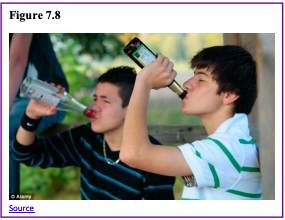
Due to social pressures to conform and expectations when entering college, the first six weeks of freshman year are an especially susceptible time for students. Additionally, more drinking occurs in colleges with active Greek systems and athletic programs. Alcohol consumption is lowest among students living with their families and commuting, while it is highest among those living in fraternities and sororities.
College Strategies to Curb Drinking: Strategies to address college drinking involve the individual-level and campus community as a whole. Identifying at-risk groups, such as first-year students, members of fraternities and sororities, and athletes have proven helpful in changing students’ knowledge, attitudes, and behavior regarding alcohol (NIAAA, 2015).
Interventions include education and awareness programs, as well as intervention by health professionals. At the college-level, reducing the availability of alcohol has proven effective by decreasing both consumption and negative consequences.
Non-Alcohol Substance Use: Illicit drug use peaks between the ages of 19 and 22 and then begins to decline. Additionally, 25% of those who smoke cigarettes, 33% of those who smoke marijuana, and 70% of those who abuse cocaine began using after age 17 (Volkow, 2004).

Emerging adults (18 to 25) are the largest abusers of prescription opioid pain relievers, anti-anxiety medications, and Attention Deficit Hyperactivity Disorder medication (National Institute on Drug Abuse, 2015). In 2016, opioid misuse within the past 12 months was reported by 3.6% of 12-17 year-olds and was twice as high among those 18-25 (Office of Adolescent Health, 2019). In 2014 more than 1700 emerging adults died from a prescription drug overdose. This is an increase of four times since 1999. Additionally, for every death, there were 119 emergency room visits.
Daily marijuana use is at the highest level in three decades (National Institute on Drug Abuse, 2015). For those in college, 2014 data indicate that 6% of college students smoke marijuana daily, while only 2% smoked daily in 1994. For noncollege students of the same age, the daily percentage is twice as high (approximately 12%). Additionally, according to a recent survey by the National Institute of Drug Abuse (2018), daily cigarette smoking is lower for those in college in comparison to non-college groups (see Figure 7.10).
Figure 7.10
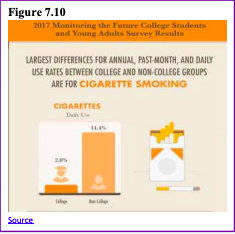
Rates of violent death are influenced by substance use which peaks during emerging and early adulthood. Drugs impair judgment, reduce inhibitions, and alter mood, all of which can lead to dangerous behavior. Reckless driving, violent altercations, and forced sexual encounters are some examples. Drug and alcohol use increase the risk of sexually transmitted infections because people are more likely to engage in risky sexual behavior when under the influence. This includes having sex with someone who has had multiple partners, having anal sex without the use of a condom, having multiple partners, or having sex with someone whose history is unknown. Lastly, as previously discussed, drugs and alcohol ingested during pregnancy have a teratogenic effect on the developing embryo and fetus.
Gender
As previously discussed in chapter 4, gender is the cultural, social and psychological meanings associated with masculinity and feminity. A person’s sense of self as a member of a particular gender is known as gender identity. Because gender is considered a social construct, meaning that it does not exist naturally, but is instead a concept that is created by cultural and societal norms, there are cultural variations on how people express their gender identity. For example, in American culture, it is considered feminine to wear a dress or skirt. However, in many Middle Eastern, Asian, and African cultures, dresses or skirts (often referred to as sarongs, robes, or gowns) can be considered masculine. Similarly, the kilt worn by a Scottish male does not make him appear feminine in his culture.
For many adults, the drive to adhere to masculine and feminine gender roles, or the societal expectations associated with being male or female, continues throughout life. In American culture, masculine roles have traditionally been associated with strength, aggression, and dominance, while feminine roles have traditionally been associated with passivity, nurturing, and subordination. Men tend to outnumber women in professions such as law enforcement, the military, and politics, while women tend to outnumber men in care-related occupations such as childcare, healthcare, and social work. These occupational roles are examples of stereotypical American male and female behavior, derived not from biology or genetics, but from our culture’s traditions. Adherence to these roles may demonstrate fulfillment of social expectations, however, not necessarily personal preferences (Diamond, 2002).
Consequently, many adults are challenging gender labels and roles, and the long-standing gender binary; that is, categorizing humans as only female and male, has been undermined by current psychological research (Hyde, Bigler, Joel, Tate, & van Anders, 2019). The term gender now encompasses a wide range of possible identities, including cisgender, transgender, agender, genderfluid, genderqueer, gender nonconforming, bigender, pangender, ambigender, non- gendered, intergender, and Two-spirit which is a modern umbrella term used by some indigenous North Americans to describe gender-variant individuals in their communities (Carroll, 2016). Hyde et al. (2019) advocate for a conception of gender that stresses multiplicity and diversity and uses multiple categories that are not mutually exclusive.
Gender Minority Discrimination: Gender nonconforming people are much more likely to experience harassment, bullying, and violence based on their gender identity; they also experience much higher rates of discrimination in housing, employment, healthcare, and education (Borgogna, McDermott, Aita, & Kridel, 2019; National Center for Transgender Equality, 2015). Transgender individuals of color face additional financial, social, and interpersonal challenges, in comparison to the transgender community as a whole, as a result of structural racism. Black transgender people reported the highest level of discrimination among all transgender individuals of color. As members of several intersecting minority groups, transgender people of color, and transgender women of color, in particular, are especially vulnerable to employment discrimination, poor health outcomes, harassment, and violence. Consequently, they face even greater obstacles than white transgender individuals and cisgender members of their own race.
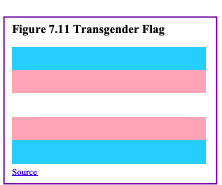
Gender Minority Status and Mental Health: Using data from over 43,000 college students, Borgona et al. (2019) examined mental health differences among several gender groups, including those identifying as cisgender, transgender and gender nonconforming. Results indicated that participants who identified as transgender and gender nonconforming had significantly higher levels of anxiety and depression than those identifying as cisgender. Bargona et al. explained the higher rates of anxiety and depression using the minority stress model, which states that an unaccepting social environment results in both external and internal stress which contributes to poorer mental health. External stressors include discrimination, harassment, and prejudice, while internal stressors include negative thoughts, feelings, and emotions resulting from one’s identity. Bargona et al. recommend that mental health services that are sensitive to both gender minority and sexual minority status be available.
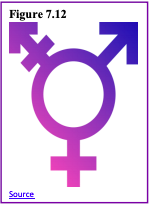
The transgender children discussed in chapter 4 may, when they become an adult, alter their bodies through medical interventions, such as surgery and hormonal therapy so that their physical being is better aligned with gender identity. However, not all transgender individuals choose to alter their bodies or physically transition. Many will maintain their original anatomy but may present themselves to society as a different gender, often by adopting the dress, hairstyle, mannerisms, or other characteristics typically assigned to a certain gender. It is important to note that people who cross-dress or wear clothing that is traditionally assigned to the opposite gender, such as transvestites, drag kings, and drag queens, do not necessarily identify as transgender (though some do). People often confuse the term transvestite, which is the practice of dressing and acting in a style or manner traditionally associated with another sex (APA, 2013) with transgender. Cross-dressing is typically a form of self-expression, entertainment, or personal style, and not necessarily an expression about one’s gender identity.
Sexuality
Human sexuality refers to people’s sexual interest in and attraction to others, as well as their capacity to have erotic experiences and responses. Sexuality may be experienced and expressed in a variety of ways, including thoughts, fantasies, desires, beliefs, attitudes, values, behaviors, practices, roles, and relationships. These may manifest themselves in biological, physical, emotional, social, or spiritual aspects. The biological and physical aspects of sexuality largely concern the human reproductive functions, including the human sexual response cycle and the basic biological drive that exists in all species. Emotional aspects of sexuality include bonds between individuals that are expressed through profound feelings or physical manifestations of love, trust, and care. Social aspects deal with the effects of human society on one’s sexuality, while spirituality concerns an individual’s spiritual connection with others through sexuality. Sexuality also impacts and is impacted by cultural, political, legal, philosophical, moral, ethical, and religious aspects of life.
The Sexual Response Cycle: Sexual motivation, often referred to as libido, is a person’s overall sexual drive or desire for sexual activity. This motivation is determined by biological, psychological, and social factors. In most mammalian species, sex hormones control the ability to engage in sexual behaviors. However, sex hormones do not directly regulate the ability to copulate in primates (including humans); rather, they are only one influence on the motivation to engage in sexual behaviors. Social factors, such as work and family, also have an impact, as do internal psychological factors like personality and stress. Sex drive may also be affected by hormones, medical conditions, medications, lifestyle stress, pregnancy, and relationship issues.
The sexual response cycle is a model that describes the physiological responses that take place during sexual activity. According to Kinsey, Pomeroy, and Martin (1948), the cycle consists of four phases: excitement, plateau, orgasm, and resolution. The excitement phase is the phase in which the intrinsic (inner) motivation to pursue sex arises. The plateau phase is the period of sexual excitement with increased heart rate and circulation that sets the stage for orgasm. Orgasm is the release of tension, and the resolution period is the unaroused state before the cycle begins again.
The Brain and Sex: The brain is the structure that translates the nerve impulses from the skin into pleasurable sensations. It controls the nerves and muscles used during sexual behavior. The brain regulates the release of hormones, which are believed to be the physiological origin of sexual desire. The cerebral cortex, which is the outer layer of the brain that allows for thinking and reasoning, is believed to be the origin of sexual thoughts and fantasies. Beneath the cortex is the limbic system, which consists of the amygdala, hippocampus, cingulate gyrus, and septal area. These structures are where emotions and feelings are believed to originate, and they are important for sexual behavior.
The hypothalamus is the most important part of the brain for sexual functioning. This is the small area at the base of the brain consisting of several groups of nerve-cell bodies that receives input from the limbic system. Studies with lab animals have shown that the destruction of certain areas of the hypothalamus causes the complete elimination of sexual behavior. One of the reasons for the importance of the hypothalamus is that it controls the pituitary gland, which secretes hormones that control the other glands of the body.
Figure 7.13
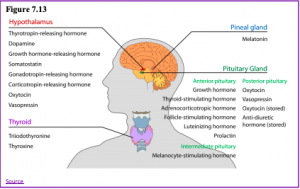
Hormones: Several important sexual hormones are secreted by the pituitary gland. Oxytocin, also known as the hormone of love, is released during sexual intercourse when an orgasm is achieved. Oxytocin is also released in females when they give birth or are breastfeeding; it is believed that oxytocin is involved with maintaining close relationships. Both prolactin and oxytocin stimulate milk production in females. Follicle-stimulating hormone (FSH) is responsible for ovulation in females by triggering egg maturity; it also stimulates sperm production in males. Luteinizing hormone (LH) triggers the release of a mature egg in females during the process of ovulation. In males, testosterone appears to be a major contributing factor to sexual motivation. Vasopressin is involved in the male arousal phase, and the increase of vasopressin during erectile response may be directly associated with increased motivation to engage in sexual behavior.
The relationship between hormones and female sexual motivation is not as well understood, largely due to the overemphasis on male sexuality in Western research. Estrogen and progesterone typically regulate motivation to engage in sexual behavior for females, with estrogen increasing motivation and progesterone decreasing it. The levels of these hormones rise and fall throughout a woman’s menstrual cycle. Research suggests that testosterone, oxytocin, and vasopressin are also implicated in female sexual motivation in similar ways as they are in males, but more research is needed to understand these relationships.
Sexual Responsiveness Peak: Men and women tend to reach their peak of sexual responsiveness at different ages. For men, sexual responsiveness tends to peak in the late teens and early twenties. Sexual arousal can easily occur in response to physical stimulation or fantasizing. Sexual responsiveness begins a slow decline in the late twenties and into the thirties, although a man may continue to be sexually active. Through time, a man may require more intense stimulation in order to become aroused. Women often find that they become more sexually responsive throughout their 20s and 30s and may peak in the late 30s or early 40s. This is likely due to greater self-confidence and reduced inhibitions about sexuality.
Sexually Transmitted Infections: Sexually transmitted infections (STIs), also referred to as sexually transmitted diseases (STDs) or venereal diseases (VDs) are illnesses that have a significant probability of transmission by means of sexual behavior, including vaginal intercourse, anal sex, and oral sex. Some STIs can also be contracted by sharing intravenous drug needles with an infected person, as well as through childbirth or breastfeeding.
Common STIs include:
- chlamydia;
- herpes (HSV-1 and HSV-2);
- human papillomavirus (HPV);
- gonorrhea;
- syphilis;
- trichomoniasis;
- HIV (human immunodeficiency virus) and AIDS (acquired immunodeficiency syndrome).
According to the Centers for Disease Control and Prevention (CDC) (2014), there was an increase in the three most common types of STDs in 2014. These include 1.4 million cases of chlamydia, 350,000 cases of gonorrhea, and 20,000 cases of syphilis. Those most affected by STDS include those younger, gay/bisexual males, and females. The most effective way to prevent transmission of STIs is to practice safe sex and avoid direct contact of skin or fluids which can lead to transfer with an infected partner. Proper use of safe-sex supplies (such as male condoms, female condoms, gloves, or dental dams) reduces contact and risk and can be effective in limiting exposure; however, some disease transmission may occur even with these barriers.
Societal Views on Sexuality: Society’s views on sexuality are influenced by everything from religion to philosophy, and they have changed throughout history and are continuously evolving. Historically, religion has been the greatest influence on sexual behavior in the United States; however, in more recent years, peers and the media have emerged as two of the strongest influences, particularly among American teens (Potard, Courtois, & Rusch, 2008).
Mass media in the form of television, magazines, movies, and music continues to shape what is deemed appropriate or normal sexuality, targeting everything from body image to products meant to enhance sex appeal. Media serves to perpetuate a number of social scripts about sexual relationships and the sexual roles of men and women, many of which have been shown to have both empowering and problematic effects on people’s (especially women’s) developing sexual identities and sexual attitudes.
Cultural Differences: In the West, premarital sex is normative by the late teens, more than a decade before most people enter marriage. In the United States and Canada, and in northern and eastern Europe, cohabitation is also normative; most people have at least one cohabiting partnership before marriage. In southern Europe, cohabiting is still taboo, but premarital sex is tolerated in emerging adulthood. In contrast, both premarital sex and cohabitation remain rare and forbidden throughout Asia. Even dating is discouraged until the late twenties when it would be a prelude to a serious relationship leading to marriage. In cross-cultural comparisons, about three-fourths of emerging adults in the United States and Europe report having had premarital sexual relations by age 20, versus less than one fifth in Japan and South Korea (Hatfield & Rapson, 2006).
Sexual Orientation: A person’s sexual orientation is their emotional and sexual attraction to a particular gender. It is a personal quality that inclines people to feel romantic or sexual attraction (or a combination of these) to persons of a given sex or gender. According to the American Psychological Association (APA) (2016), sexual orientation also refers to a person’s sense of identity-based on those attractions, related behaviors, and membership in a community of others who share those attractions. Sexual orientation is independent of gender; for example, a transgender person may identify as heterosexual, homosexual, bisexual, pansexual, polysexual, asexual, or any other kind of sexuality, just like a cisgender person.
Sexual Orientation on a Continuum: Sexuality researcher Alfred Kinsey was among the first to conceptualize sexuality as a continuum rather than a strict dichotomy of gay or straight. To classify this continuum of heterosexuality and homosexuality, Kinsey et al. (1948) created a seven-point rating scale that ranged from exclusively heterosexual to exclusively homosexual. Research done over several decades has supported this idea that sexual orientation ranges along a continuum, from exclusive attraction to the opposite sex/gender to exclusive attraction to the same sex/gender (Carroll, 2016).

However, sexual orientation now can be defined in many ways. Heterosexuality, which is often referred to as being straight, is attraction to individuals of the opposite sex/gender, while homosexuality, being gay or lesbian, is attraction to individuals of one’s own sex/gender. Bisexuality was a term traditionally used to refer to attraction to individuals of either male or female sex, but it has recently been used in nonbinary models of sex and gender (i.e., models that do not assume there are only two sexes or two genders) to refer to attraction to any sex or gender. Alternative terms such as pansexuality and polysexuality have also been developed, referring to attraction to all sexes/genders and attraction to multiple sexes/genders, respectively (Carroll, 2016).
Asexuality refers to having no sexual attraction to any sex/gender. According to Bogaert (2015), about one percent of the population is asexual. Being asexual is not due to any physical problems, and the lack of interest in sex does not cause the individual any distress. Asexuality is being researched as a distinct sexual orientation.
Development of Sexual Orientation: According to current scientific understanding, individuals are usually aware of their sexual orientation between middle childhood and early adolescence. However, this is not always the case, and some do not become aware of their sexual orientation until much later in life. It is not necessary to participate in sexual activity to be aware of these emotional, romantic, and physical attractions; people can be celibate and still recognize their sexual orientation. Some researchers argue that sexual orientation is not static and inborn but is instead fluid and changeable throughout the lifespan.
There is no scientific consensus regarding the exact reasons why an individual holds a particular sexual orientation. Research has examined possible biological, developmental, social, and cultural influences on sexual orientation, but there has been no evidence that links sexual orientation to only one factor (APA, 2016). However, biological explanations, that include genetics, birth order, and hormones will be explored further as many scientists support biological processes occurring during the embryonic and early postnatal life as playing the main role in sexual orientation (Balthazart, 2018).
Genetics: Using both twin and familial studies, heredity provides one biological explanation for same-sex orientation. Bailey and Pillard (1991) studied pairs of male twins and found that the concordance rate for identical twins was 52%, while the rate for fraternal twins was only 22%. Bailey, Pillard, Neale, and Agyei (1993) studied female twins and found a similar difference with a concordance rate of 48% for identical twins and 16% for fraternal twins. Schwartz, Kim, Kolundzija, Rieger, & Sanders (2010) found that gay men had more gay male relatives than straight men, and sisters of gay men were more likely to be lesbians than sisters of straight men.
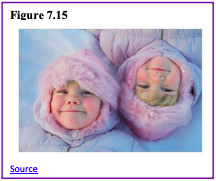
Fraternal Birth Order: The fraternal birth order effect indicates that the probability of a boy identifying as gay increases for each older brother born to the same mother (Balthazart, 2018; Blanchard, 2001). According to Bogaret et al. “the increased incidence of homosexuality in males with older brothers results from a progressive immunization of the mother against a male-specific cell-adhesion protein that plays a key role in cell-cell interactions, specifically in the process of synapse formation,” (as cited in Balthazart, 2018, p. 234). A meta-analysis indicated that the fraternal birth order effect explains the sexual orientation of between 15% and 29% of gay men.
Hormones: Excess or deficient exposure to hormones during prenatal development has also been theorized as an explanation for sexual orientation. One-third of females exposed to abnormal amounts of prenatal androgens, a condition called congenital adrenal hyperplasia (CAH), identify as bisexual or lesbian (Cohen-Bendahan, van de Beek, & Berenbaum, 2005). In contrast, too little exposure to prenatal androgens may affect male sexual orientation by not masculinizing the male brain (Carlson, 2011).
Sexual Orientation Discrimination: The United States is heteronormative, meaning that society supports heterosexuality as the norm. Consider, for example, that homosexuals are often asked, “When did you know you were gay?” but heterosexuals are rarely asked, “When did you know you were straight?” (Ryle, 2011). Living in a culture that privileges heterosexuality has a significant impact on the ways in which non-heterosexual people are able to develop and express their sexuality.
Open identification of one’s sexual orientation may be hindered by homophobia which encompasses a range of negative attitudes and feelings toward homosexuality or people who are identified or perceived as being lesbian, gay, bisexual, or transgender (LGBT). It can be expressed as antipathy, contempt, prejudice, aversion, or hatred; it may be based on irrational fear and is sometimes related to religious beliefs (Carroll, 2016). Homophobia is observable in critical and hostile behavior, such as discrimination and violence on the basis of sexual orientations that are non- heterosexual. Recognized types of homophobia include institutionalized homophobia, such as religious and state-sponsored homophobia, and internalized homophobia in which people with same-sex attractions internalize, or believe, society’s negative views and/or hatred of themselves.
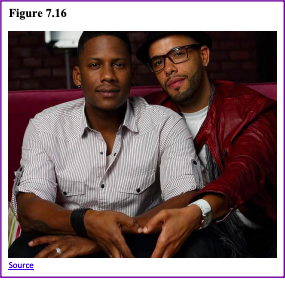
Sexual minorities regularly experience stigma, harassment, discrimination, and violence based on their sexual orientation (Carroll, 2016). Research has shown that gay, lesbian, and bisexual teenagers are at a higher risk of depression and suicide due to exclusion from social groups, rejection from peers and family, and negative media portrayals of homosexuals (Bauermeister et al., 2010). Discrimination can occur in the workplace, in housing, at schools, and in numerous public settings. Much of this discrimination is based on stereotypes and misinformation. Major policies to prevent discrimination based on sexual orientation have only come into effect in the United States in the last few years.
The majority of empirical and clinical research on LGBT populations is done with largely white, middle-class, well-educated samples. This demographic limits our understanding of more marginalized sub-populations that are also affected by racism, classism, and other forms of oppression. In the United States, non-Caucasian LGBT individuals may find themselves in a double minority, in which they are not fully accepted or understood by Caucasian LGBT communities and are also not accepted by their own ethnic group (Tye, 2006). Many people experience racism in the dominant LGBT community where racial stereotypes merge with gender stereotypes.
References
Allendorf, K. (2013). Schemas of marital change: From arranged marriages to eloping for love. Journal of Marriage and Family, 75, 453-469.
Alterovitz, S., & Mendelsohn, G. A. (2011). Partner preferences across the life span: Online dating by older adults. Psychology of Popular Media Culture, 1(S), 89-95.
American Psychiatric Association. (2013). Diagnostic and statistical manual of mental disorders (Fifth Edition). Washington, D. C.: Author.
American Psychological Association. (2016). Sexual orientation and homosexuality. Retrieved from http://www.apa.org/topics/lgbt/orientation.aspx
Arnett, J. J. (2000). Emerging adulthood: A theory of development from late teens through the twenties. American Psychologist, 55, 469-480.
Arnett, J. J. (2001). Conceptions of the transitions to adulthood: Perspectives from adolescence to midlife. Journal of Adult Development, 8, 133-143.
Arnett, J. J. (2003). Conceptions of the transition to adulthood among emerging adults in American ethnic groups. New Directions for Child and Adolescent Development, 100, 63–75.
Arnett, J. J. (2004). Conceptions of the transition to adulthood among emerging adults in American ethnic groups. In J. J. Arnett & N. Galambos (Eds.), Cultural conceptions of the transition to adulthood: New directions in child and adolescent development. San Francisco: Jossey-Bass.
Arnett, J. J. (2006). G. Stanley Hall’s adolescence: Brilliance and non-sense. History of Psychology, 9, 186-197. Arnett, J.J. (2007). The long and leisurely route: Coming of age in Europe today. Current History, 106, 130-136.
Arnett, J. J. (2011). Emerging adulthood(s): The cultural psychology of a new life stage. In L.A. Jensen (Ed.), Bridging cultural and developmental psychology: New syntheses in theory, research, and policy (pp. 255–275). New York, NY: Oxford University Press.
Arnett, J. J. (2016). Does emerging adulthood theory apply across social classes? National data on a persistent question. Emerging Adulthood, 4(4), 227-235.
Arnett, J. J., & Taber, S. (1994). Adolescence terminable and interminable: When does adolescence end? Journal of Youth and Adolescence, 23, 517–537.
Aquilino, W. S. (2006). Family relationships and support systems in emerging adulthood. In J. J. Arnett & J. L. Tanner (Eds.), Emerging adults in America: Coming of age in the 21st century (pp. 193-217). Washington, DC: American Psychological Association.
Babcock, L., Gelfand, M., Small, D., & Stayn, H. (2006). Gender differences in the propensity to initiate negotiations. In D. De Cremer, M. Zelenberg, & J.K. Muringham (Eds.), Social psychology and economics (pp. 239-262). Mahwah, NJ: Lawrence Erlbaum.
Back, M. D., Schmukle, S. C., & Egloff, B. (2008). Becoming friends by chance. Psychological Science, 19(5), 439–440. Bailey, J. M., & Pillard, R. C. (1991). A genetic study of male sexual orientation. Archives of General Psychiatry, 48, 1089-1096.
Bailey, J. M., Pillard, R. C., Neale, M. C. & Agyei, Y. (1993). Heritable factors influence sexual orientation in women. Archives of General Psychology, 50, 217-223.
Baldridge, D.C., Eddleston, K.A., & Vega, J.F. (2006). Saying no to being uprooted: The impact of family and gender on willingness to relocate. Journal of Occupational and Organizational Psychology, 79, 131-149.
Balthazart, J. (2018). Fraternal birth order effect on sexual orientation explained. Proceedings of the National Academy of Sciences of the United States of America, 115(2), 234-236.
Bartholomew, K. (1990). Avoidance of intimacy: An attachment perspective. Journal of Social and Personal Relationships, 7, 147-178. DOI: 10.1037/0022-3524.61.2.226.
Basseches, M. (1984). Dialectical thinking and adult development. Norwood, NJ: Ablex Pub.
Bauermeister, J. A., Johns, M. M., Sandfort, T. G., Eisenberg, A., Grossman, A. H., & D’Augelli, A. R. (2010). Relationship trajectories and psychological well-being among sexual minority youth. Journal of Youth and Adolescence, 39(10), 1148-1163.
Belsky, J. (1984). The determinants of parenting: A process model. Child Development, 55, 83–96.
Benokraitis, N. V. (2005). Marriages and families: Changes, choices, and constraints (5th ed.). Upper Saddle River, NJ: Pearson.
Berger, K. S. (2005). The developing person through the life span (6th ed.). New York: Worth.
Bisson, M. A., & Levine, T. R. (2009). Negotiating a friends with benefits relationship. Archives of Sexual Behavior, 38, 66–73. doi:10.1007/s10508-007-9211-2
Blanchard, R. (2001). Fraternal birth order and the maternal immune hypothesis of male homosexuality. Hormones and Behavior, 40, 105-114.
Blau, F. D., Ferber, M. A., & Winkler, A. E. (2010). The economics of women, men and work. (6th ed.). Boston, MA: Prentice Hall.
Bogaert, A. F. (2015). Asexuality: What it is and why it matters. Journal of Sex Research, 52(4), 362-379. doi:10.1080/00224499.2015.1015713
Bogle, K. A. (2007). The shift from dating to hooking up in college: What scholars have missed. Sociology Compass, 1/2, 775– 788.
Bogle, K. A. (2008). Hooking up: Sex, dating, and relationships on campus. New York, NY: New York University Press.
Bohlin, G., & Hagekull, B. (2009). Socio-emotional development from infancy to young adulthood. Scandinavian Journal of Psychology, 50, 592-601.
Borgogna, N. C., McDermott, R. C., Aita, S. L., & Kridel, M. M. (2019). Anxiety and depression across gender and sexual minorities: Implications for transgender, gender nonconforming, pansexual, demisexual, asexual, queer and questioning individuals. Psychology of Sexual Orientation and Gender Diversity, 6(1), 54-63.
Bosson, J. K., Vandello, J., & Buckner, C. (2019). The psychology of sex and gender. Thousand Oaks, CA: Sage.
Boundless. (2016). Physical development in adulthood. Boundles Psychology. Retrieved from https://www.boundless.com/psychology/textbooks/boundless-psychology-textbook/human-development-14/early-and- middle-adulthood-74/physical-development-in-adulthood-287-12822/
Bronfenbrenner, U. (1989). Ecological systems theory. In R. Vasta (Ed.), Annals of Child Development, Vol. 6 (pp. 187–251). Greenwich, CT: JAI Press.
Brooks-Gunn, J., & Lewis, M. (1981). Infant social perception: Responses to pictures of parents and strangers. Developmental Psychology, 17(5), 647–649.
Brown, A. (2019). Couples who meet online are more diverse than those who meet in other ways, largely because they’re younger. Pew Research Center. Retrieved from https://www.pewresearch.org/fact-tank/2019/06/24/couples-who-meet-online-are-more-diverse-than-those-who-meet-in-other-ways-largely-because-theyre-younger/
Bruckmuller, S., Ryan, M.K., Floor, R., & Haslam, S.A. (2014). The glass cliff: Examining why women occupy leadership positions in precarious circumstances. In S. Kumra, R. Simpson, & R.J. Burke (Eds.), Oxford handbook of gender in organizations (pp. 314-331). New York: Oxford University Press.
Bryant, K. & Sheldon, P. (2017). Cyber dating in the age of mobile apps: Understanding motives, attitudes, and characteristics of users. American Communication Journal, 19(2), 1-15.
Bumpass, L. L. (1990). What’s happening to the family? Interactions between demographic and institutional change. Demography, 27(4), 483–498.
Butzer, B., & Campbell, L. (2008). Adult attachment, sexual satisfaction, and relationship satisfaction: A study of married couples. Personal Relationships, 15, 141-154.
Cain, S. (2012). Quiet. New York: Crown Publishing Group.
Campbell, L., Simpson, J. A., Boldry, J., & Kashy, D. A. (2005). Perceptions of conflict and support in romantic relationships: The role of attachment anxiety. Journal of Personality and Social Psychology, 88, 510-532.
Carlson, N. R. (2011). Foundations of behavioral neuroscience (8th ed.). Boston, MA: Pearson Education.
Carroll, J. L. (2007). Sexuality now: Embracing diversity (2nd ed.). Belmont, CA: Thomson Learning.
Carroll, J. L. (2016). Sexuality now: Embracing diversity (5th ed.). Boston, MA: Cengage Learning.
Ceci, S. J., & Williams, W. M. (2011). Understanding current causes of women’s under-representation in science. Proceedings of the National Academy of Science of the United States of America, 108(8), 3157-3162. doi:10.1073/pnas.1014871108
Centers for Disease Control and Prevention (2014). Reported STDs in the United States. Retrieved from http://www.cdc.gov/std/stats14/std-trends-508.pdf
Centers for Disease Control and Prevention (2015a). Births and natality. Retrieved from http://www.cdc.gov/nchs/fastats/births.htm
Centers for Disease Control and Prevention. (2015b). Obesity and overweight. Retrieved from http://www.cdc.gov/nchs/fastats/obesity-overweight.htm
Centers for Disease Control and Prevention. (2016). Adult obesity causes and consequences. Retrieved from http://www.cdc.gov/obesity/adult/causes.html
Channick, R. (2019, July 9). Putting gender pay gap onto a broader stage. The Chicago Tribune, pp. 1-2.
Chappell, K. D., & Davis, K. E. (1998). Attachment, partner choice, and perception of romantic partners: An experimental test of the attachment-security hypothesis. Personal Relationships, 5, 327–342.
Chess, S., & Thomas, A. (1987). Origins and evolution of behavior disorders. Cambridge, MA: Harvard University Press.
Chopik, W. J., Edelstein, R. S., & Fraley, R. C. (2013). From the cradle to the grave: Age differences in attachment from early adulthood to old age. Journal or Personality, 81 (2), 171-183 DOI: 10.1111/j. 1467-6494.2012.00793
Cicirelli, V. (2009). Sibling relationships, later life. In D. Carr (Ed.), Encyclopedia of the life course and human development. Boston, MA: Cengage.
Clark, L. A., Kochanska, G., & Ready, R. (2000). Mothers’ personality and its interaction with child temperament as predictors of parenting behavior. Journal of Personality and Social Psychology, 79, 274–285.
Clark, L. A. & Watson, D. (1999). Temperament: A new paradigm for trait theory. In L.A. Pervin & O. P. John (Eds.), Handbook of personality. NY: Guilford.
Clarke, L., & Nichols, J. (1972). I have more fun with you than anybody. New York, NY: St. Martin’s.
Cohen, P. (2013). Marriage is declining globally. Can you say that? Retrieved from https://familyinequality.wordpress.com/2013/06/12/marriage-is-declining/
Cohen-Bendehan, C. C., van de Beek, C. & Berenbaum, S. A. (2005). Prenatal sex hormone effects on child and adult sex-typed behavior: Methods and findings. Neuroscience and Biobehavioral Reviews, 47, 230-237.
Cohn, D. (2013). In Canada, most babies now born to women 30 and older. Pew Research Center.
Conger, R. D., & Conger, K. J. (2002). Resilience in Midwestern families: Selected findings from the first decade of a prospective longitudinal study. Journal of Marriage and Family, 64, 361–373.
Copen, C.E., Daniels, K., & Mosher, W.D. (2013) First premarital cohabitation in the United States: 2006–2010 National Survey of Family Growth. National health statistics reports; no 64. Hyattsville, MD: National Center for Health Statistics.
Council of Economic Advisors. (2015). Gender pay gap: Recent trends and explanations. Retrieved from https://www.whitehouse.gov/sites/default/files/docs/equal_pay_issue_brief_final.pdf
Crowley, K., Callanan, M. A., Tenenbaum, H. R., & Allen, E. (2001). Parents explain more often to boys than to girls during shared scientific thinking. Psychological Science, 12, 258–261.
Davidson, R. J. & Begley, S. (2012). The emotional life of your brain. New York: Penguin.
Davis, J. L., & Rusbult, C. E. (2001). Attitude alignment in close relationships. Journal of Personality & Social Psychology, 81(1), 65–84.
Demick, J. (1999). Parental development: Problem, theory, method, and practice. In R. L. Mosher, D. J. Youngman, & J. M. Day (Eds.), Human development across the life span: Educational and psychological applications (pp. 177–199). Westport, CT: Praeger.
Desai, S., & Andrist, L. (2010). Gender scripts and age at marriage in India. Demography, 47, 667-687. doi:10.1353/dem.0.0118 Desilver, D. (2016) Millions of young people in the US and EU are neither working nor learning. Pew Research Center (January 28, 2016). http://www.pewresearch.org/fact-tank/2016/01/28/us-eu-neet-population/
Diamond, M. (2002). Sex and gender are different: Sexual identity and gender identity are different. Clinical Child Psychology and Psychiatry, 7(3), 320-334.
Douglass, C. B. (2007). From duty to desire: Emerging adulthood in Europe and its consequences. Child Development Perspectives, 1, 101–108.
Driver, J., & Gottman, J. (2004). Daily marital interactions and positive affect during marital conflict among newlywed couples. Family Process, 43, 301–314.
Dunn, J. (1984). Sibling studies and the developmental impact of critical incidents. In P.B. Baltes & O.G. Brim (Eds.), Life-span development and behavior (Vol 6). Orlando, FL: Academic Press.
Dunn, J. (2007). Siblings and socialization. In J. E. Grusec & P. D. Hastings (Eds.), Handbook of socialization. New York: Guilford.
Dye, J. L. (2010). Fertility of American women: 2008. Current Population Reports. Retrieved from www.census.gov/prod/2010pubs/p20-563.pdf.
Ebrahimi, L., Amiri, M., Mohamadlou, M., & Rezapur, R. (2017). Attachment stules, parenting styles, and depression. International Journal of Mental Health, 15, 1064-1068.
Eisenberg, N., Fabes, R. A., Shepard, S. A., Guthrie, I.K., Murphy, B.C., & Reiser, M. (1999). Parental reactions to children’s negative emotions: Longitudinal relations to quality of children’s social functioning. Child Development, 70, 513-534.
Eisenberg, N., Hofer, C., Spinrad, T., Gershoff, E., Valiente, C., Losoya, S. L., Zhou, Q., Cumberland, A., Liew, J., Reiser, M., & Maxon, E. (2008). Understanding parent-adolescent conflict discussions: Concurrent and across-time prediction from youths’ dispositions and parenting. Monographs of the Society for Research in Child Development, 73, (Serial No. 290, No. 2), 1-160.
Erikson, E. H. (1950). Childhood and society. New York: Norton. Erikson, E. H. (1968). Identity: Youth and crisis. New York: Norton.
Finkel, E. J., Burnette J. L., & Scissors L. E. (2007). Vengefully ever after: Destiny beliefs, state attachment anxiety, and forgiveness. Journal of Personality and Social Psychology, 92, 871–886.
Fraley, R. C. (2013). Attachment through the life course. In R. Biswas-Diener & E. Diener (Eds), Noba textbook series: Psychology. Champaign, IL: DEF publishers. Retrieved from nobaproject.com.
Fraley, R. C., Hudson, N. W., Heffernan, M. E., & Segal, N. (2015). Are adult attachment styles categorical or dimensional? A taxometric analysis of general and relationship-specific attachment orientations. Journal of Personality and Social Psychology, 109 (2), 354-368.
Fraley, R. C., Roisman, G. I., Booth-LaForce, C., Owen, M. T., & Holland, A. S. (2013). Interpersonal and genetic origins of adult attachment styles: A longitudinal study from infancy to early adulthood. Journal of Personality and Social Psychology, 104, 8817-838.
Frazier, P. A, Byer, A. L., Fischer, A. R., Wright, D. M., & DeBord, K. A. (1996). Adult attachment style and partner choice: Correlational and experimental findings. Personal Relationships, 3, 117–136.
Freitas, A. L., Azizian, A., Travers, S., & Berry, S. A. (2005). The evaluative connotation of processing fluency: Inherently positive or moderated by motivational context? Journal of Experimental Social Psychology, 41(6), 636–644.
Frieden, T. (2011, January 14). Morbidity and Mortality Weekly Report for the Centers for Disease Control (United States, Center for Disease Control). Retrieved from http://www.cdc.gov/mmwr/preview/mmwrhtml/su6001al.htm?s_su6001al_w
Friedman, H. S., Tucker, J. S., Tomlinson-Keasey, C., Schwartz, J. E., Wingard, D. L., & Criqui, M. H. (1993). Does childhood personality predict longevity? Journal of Personality and Social Psychology, 65, 176–185. doi:10.1037/0022- 3514.65.1.176
Fry, R. (2016). For the first time in the modern era, living with parents edges out other living arrangements for 18- to 34- year-olds. Washington, D.C.: Pew Research Center.
Fry, R. (2018). Millennials are the largest generation in the U. S. labor force. Retrieved from: https://www.pewresearch.org/fact- tank/2018/04/11/millennials-largest-generation-us-labor-force/
Fryar, C. D., Carroll, M. D., & Ogden, C. L. (2014). Prevalence of overweight, obesity, and extreme obesity among adults: United States, 1960-1962 through 2011-2012. Retrieved from http://www.cdc.gov/nchs/data/hestat/obesity_adult_11_12/obesity_adult_11_12.htm
Gallup Poll Report (2016). What millennials want from work and life. Business Journal. Retrieved from http://www.gallup.com/businessjournal/191435/millennials-work-life.aspx
Garcia, J. R., & Reiber, C. (2008). Hook-up behavior: A biopsychosocial perspective. The Journal of Social, Evolutionary, and Cultural Psychology, 2, 192–208.
Garcia, J. R., Reiber, C., Massey, S. G., & Merriwether, A. M. (2012). Sexual hookup culture: A review. Review of General Psychology, 16(2), 161-176. doi:10.1037/a0027911
Gates, G. J. (2011). How many people are lesbian, gay, bisexual and transgender? Retrieved from http://williamsinstitute.law.ucla.edu/research/census-lgbt-demographics-studies/how-many-people-are-lesbian-gay- bisexual-and-transgender/
Gonzales, N. A., Coxe, S., Roosa, M. W., White, R. M. B., Knight, G. P., Zeiders, K. H., & Saenz, D. (2011). Economic hardship, neighborhood context, and parenting: Prospective effects on Mexican-American adolescent’s mental health. American Journal of Community Psychology, 47, 98–113. doi: 10.1007/s10464-010-9366-1
Gottman, J. M. (1999). Couple’s handbook: Marriage Survival Kit Couple’s Workshop. Seattle, WA: Gottman Institute.
Gottman, J. M., Carrere, S., Buehlman, K. T., Coan, J. A., & Ruckstuhl, L. (2000). Predicting marital stability and divorce in newlywed couples. Journal of Family Psychology, 14(1), 42-58.
Gottman, J. M., & Levenson, R. W. (1992). Marital processes predictive of later dissolution: Behavior, physiology and health. Journal of Personality and Social Psychology, 63, 221–233.
Grello, C. M., Welsh, D. P., Harper, M. S., & Dickson, J. W. (2003). Dating and sexual relationship trajectories and adolescent functioning. Adolescent & Family Health, 3, 103–112.
Grusec, J. E., Goodnow, J. J., & Cohen, L. (1996). Household work and the development of concern for others. Developmental Psychology, 32, 999–1007.
Gurrentz, B. (2018). For young adults, cohabitation is up, and marriage is down. US. Census Bureau. Retrieved from https://www.census.gov/library/stories/2018/11/cohabitaiton-is-up-marriage-is-down-for-young-adults.html.
Gwinnell, E. (1998). Online seductions: Falling in love with strangers on the Internet. New York: Johnson Publishing.
Hales, C.M., Carroll, M.D., Fryar, C.D., & Ogden, C.L. (2017). Prevalence of obesity among adults and youth: United States, 2015–2016. NCHS data brief, no 288. Hyattsville, MD: National Center for Health Statistics.
Hamilton, B. E., Martin, J. A., & Ventura, S. J. (2011). Births: Preliminary data for 2010. National Vital Statistics Reports, 60(2).
Hyattsville, MD: U.S. Department of Health and Human Services.
Harmon-Jones, E., & Allen, J. J. B. (2001). The role of affect in the mere exposure effect: Evidence from psychophysiological and individual differences approaches. Personality & Social Psychology Bulletin, 27(7), 889–898.
Harvard Health Letter. (2012). Raising your conscientiousness. Retrieved from http://www.helath.harvard.edu
Hatfield, E., & Rapson, R. L. (2006). Love and sex: Cross-cultural perspectives. New York, NY: University Press of America.
Hazan, C., & Shaver, P. (1987). Romantic love conceptualized as an attachment process. Journal of Personality and Social Psychology, 52 (3), 511-524.
Hegewisch, A., & Ellis, E. (2015). The gender wage gap by occupation 2014 and by race and ethnicity. Washington DC: Institute for Women’s Policy Research. Retrieved from http://www.iwpr.org/publications/pubs/the-gender-wage-gap-by- occupation-2014-and-by-race-and-ethnicity.
Hendrick, C., & Hendrick, S. S. (Eds.). (2000). Close relationships: A sourcebook. Thousand Oaks, CA: Sage.
Heron, M. P., & Smith, B. L. (2007). Products – Health E Stats – Homepage. Centers for Disease Control and Prevention. Retrieved from http://www.cdc.gov/nchs/products/pubs/pubd/hestats/leadingdeath03/leadingdeath03.htm
Hess, A. (2019). Today is the Women’s World Cup final between the US and Netherlands—here’s how much money is on the line. Retrieved from https://www.cnbc.com/2019/07/04/womens-world-cup-final-how-much-money-is-on-the- line.html
Holland, A. S., Fraley, R. C., & Roisman, G. I. (2012). Attachment styles in dating couples: Predicting relationship functioning over time. Personal Relationships, 19, 234-246. doi: 10.1111/j.1475-6811.2011.01350.x
Hudson, N. W., Fraley, R. C., Vicary, A. M., & Brumbaugh, C. C. (2012). Attachment coregulation: A longitudinal investigation of the coordination in romantic partners’ attachment styles. Manuscript under review.
Hyde, J. S., Bigler, R., Joel, D., Tate, C., & van Anders, S. (2019). The future of sex and gender in psychology: Five challenges to the gender binary. American Psychologist, 74(2), 171-193.
Hyde, J. S., Else-Quest, N. M., & Goldsmith, H. H. (2004). Children’s temperament and behavior problems predict their employed mothers’ work functioning. Child Development, 75, 580–594.
Institute for College Access & Success. (2018). Student debt and the class of 2017. Retrieved from https://ticas.org/posd/home.
Janicki, D., Kamarck, T., Shiffman, S., & Gwaltney, C. (2006). Application of ecological momentary assessment to the study of marital adjustment and social interactions during daily life. Journal of Family Psychology, 20, 168–172.
John, O. P., Naumann, L. P., & Soto, C. J. (2008). Paradigm shift to the integrative Big Five trait taxonomy: History, measurement, and conceptual issues. In O. P. John, R. R. Robins, & L. A. Pervin (Eds.), Handbook of personality. Theory and research (3rd ed., pp. 114–158). New York, NY: Guilford Press. 301
John, O. P., Robins, R. W., & Pervin, L. A. (2008). Handbook of personality. Theory and research (3rd ed.). New York, NY: Guilford Press.
Kagan, J. (2002). Behavioral inhibition as a temperamental category. In R.J. Davidson, K. R. Scherer, & H. H. Goldsmith (Eds.), Handbook of affective sciences. New York: Oxford University Press.
Kerr, D. C. R., Capaldi, D. M., Pears, K. C., & Owen, L. D. (2009). A prospective three generational study of fathers’ constructive parenting: Influences from family of origin, adolescent adjustment, and offspring temperament. Developmental Psychology, 45, 1257–1275.
Kiff, C. J., Lengua, L. J., & Zalewski, M. (2011). Nature and nurturing: Parenting in the context of child temperament. Clinical Child and Family Psychology Review, 14, 251–301. doi: 10.1007/s10567011-0093-4
Kinsey, A., Pomeroy, W.B., & Martin, C. E. (1948). Sexual behavior in the human male. Philadelphia, PA: Saunders. Krebs, C., Lindquist, C., Warner, T., Fisher, B., & Martin, S. (2009). College women’s experiences with physically forced, alcohol or other drug-enabled, and drug-facilitated sexual assault before and since entering college. Journal of American College Health, 57(6), 639-649.
Kreighbaum, A. (2019). Six figures in debt for a master’s degree. Retrieved from https://www.insidehighered.com/news/2019/06/03/updated-college-scorecard-puts-spotlight-graduate-student- borrowing
Laursen, B., & Jensen-Campbell, L. A. (1999). The nature and functions of social exchange in adolescent romantic relationships. In W. Furman, B. B. Brown, & C. Feiring (Eds.), The development of romantic relationships in adolescence (pp. 50– 74). New York: Cambridge University Press.
Lesthaeghe, R. J., & Surkyn, J. (1988). Cultural dynamics and economic theories of fertility change. Population and Development Review 14(1), 1–45.
Lucas, R. E. & Donnellan, A. B. (2011). Personality development across the life span: Longitudinal analyses with a national sample from Germany. Journal of Personality and Social Psychology, 101, 847–861
Madden, M. & Lenhart, A. (2006). Americans who are seeking romance use the Internet to help them in their search, but there is still widespread public concern about safety of online dating. Pew/Internet and American Life Project. Retrieved from http://www.pewinternet.org/Reports/2006/OnlineDating.aspx
Mandel, H. (2013). Up the down staircase: Women’s upward mobility and the wage penalty for occupational feminization, 1970- 2007. Social Forces, 91, 1183-1207.
Manning, W. S., Giordano, P. C., & Longmore, M. A. (2006). Hooking up: The relationship contexts of “nonrelationship” sex. Journal of Adolescent Research, 21, 459–483. doi:10.1177/0743558406291692
Martinez, G., Daniels, K., & Chandra, A. (2012). Fertility of men and women aged 15-44 years in the United States: National Survey of Family Growth, 2006-2010. National Health Statistics Reports, 51(April). Hyattsville, MD: U.S., Department of Health and Human Services.
McClure, M. J., Lydon., J. E., Baccus, J., & Baldwin, M. W. (2010). A signal detection analysis of the anxiously attached at speed-dating: Being unpopular is only the first part of the problem. Personality and Social Psychology Bulletin, 36, 1024–1036.
Menkin, J. A., Robles, T. F., Wiley, J. F., & Gonzaga, G. C. (2015). Online dating across the life span: Users’ relationship goals. Psychology and Aging, 30(4), 987-993.
Mita, T. H., Dermer, M., & Knight, J. (1977). Reversed facial images and the mere-exposure hypothesis. Journal of Personality & Social Psychology, 35(8), 597–601.
National Center for Transgender Equality. (2015). National transgender discrimination survey. Retrieved from http://www.transequality.org/issues/national-transgender-discrimination-survey
National Conference of State Legislatures. (2017, June). Cyberbullies go catfishing. State Legislatures, 8.
National Institute on Alcohol Abuse and Alcoholism. (2015). College Drinking. Retrieved from http://pubs.niaaa.nih.gov/publications/CollegeFactSheet/CollegeFact.htm
National Institute on Alcohol Abuse and Alcoholism. (2016). Alcohol facts and statistics. Retrieved from http://pubs.niaaa.nih.gov/publications/AlcoholFacts&Stats/AlcoholFacts&Stats.htm
National Institute on Drug Abuse. (2015). College-age and young adults. Retrieved from https://www.drugabuse.gov/related- topics/college-age-young-adults/college-addiction-studies-programs
National Institute of Drug Abuse. (2018). College-age and young adults. Retrieved from https://www.drugabuse.gov/related- topics/college-age-young-adults
NCHEMS. (2016a). Percent of adults 18 to 24 with a high school diploma. National Center for Higher Education Management Systems http://www.higheredinfo.org/dbrowser/?level=nation&mode=graph&state=0&submeasure=344
NCHEMS. (2016b). Percent of adults 18 to 24 who are attending college. National Center for Higher Education Management Systems. Retrieved from: http://www.higheredinfo.org/dbrowser/index.php?submeasure=331&year=2009&level=nation&mode=graph&state=0
NCHEMS. (2016c). Percent of adults 25 to 49 who are attending college. National Center for Higher Education Management Systems. Retrieved from: http://www.higheredinfo.org/dbrowser/index.php?submeasure=332&year=2009&level=nation&mode=graph&state=0
NCHEMS. (2016d). Percent who earn a Bachelor’s degree within 6 years. National Center for Higher Education Management Systems. Retrieved from http://www.higheredinfo.org/dbrowser/?level=nation&mode=graph&state=0&submeasure=27
Nelson, L. J., Badger, S., & Wu, B. (2004). The influence of culture in emerging adulthood: Perspectives of Chinese college students. International Journal of Behavioral Development, 28, 26–36.
Noland, M., Moran, T., & Kotschwar, B. (2016). Is gender diversity profitable? Evidence from a global survey. Washington, DC: Peterson Institute for International Economics. Retrieved from https://www.piie.com/publications/working-papers/gender- diversity-profitable-evidence-global-survey.
OECD. (2014). Education at a Glance 2014: United States, OECD Publishing. Retrieved from https://www.oecd.org/unitedstates/United%20States-EAG2014-Country-Note.pdf
OECD. (2015). Education at a Glance 2015: OECD Indicators, OECD Publishing. Retrieved from http://dx.doi.org/10.1787/eag-2015-en
Office of Adolescent Health. (2019). Prevalence of adolescent opioid misuse. Retrieved from https://www.hhs.gov/ash/oah/adolescent-development/substance-use/drugs/opioids/index.html#prevalence
Oliver, M. B., & Hyde, J. S. (1993). Gender differences in sexuality: A meta-analysis. Psychological Bulletin, 114, 29–51. doi:10.1037/0033-2909.114.1.29
Organization for Economic Cooperation and Development. (2019). Youth on in employment, education, or training data. Retrieved from https://data.oecd.org/youthinac/youth-not-in-employment-education-or-training-neet.htm
Owen, J., & Fincham, F. D. (2011). Young adults’ emotional reactions after hooking up encounters. Archives of Sexual Behavior, 40, 321–330. doi:10.1007/s10508-010-9652-x
Pascarella, E.T. (2006). How college effects students: Ten directions for future research. Journal of College Student Development, 47, 508-520.
Patton, W. & McMahon, M. (1999). Career development and systems theory: A new relationship. Brooks Cole Publishers. Peterson, A. (2019, July 9). Women’s World Cup. Changes could go global. The Chicago Tribune, p. 5.
Pew Research Center. (2019). Same-sex marriage around the world. Retrieved from https://www.pewforum.org/fact-sheet/gay- marriage-around-the-world/
Phinney, J. S. & Baldelomar, O. A. (2011). Identity development in multiple cultural contexts. In L. A. Jensen (Ed.), Bridging cultural and developmental psychology: New syntheses in theory, research and policy (pp. 161-186). New York, NY: Oxford University Press.
Potard, C., Courtois, R., & Rusch, E. (2008). The influences of peers on risky behavior during adolescence. European Journal of Contraception and Reproductive Health Care, 13(30, 264-270.
Prinzie, P., Stams, G. J., Dekovic, M., Reijntjes, A. H., & Belsky, J. (2009). The relations between parents’ Big Five personality factors and parenting: A meta-review. Journal of Personality and Social Psychology, 97, 351–362.
Rankin, L. A. & Kenyon, D. B. (2008). Demarcating role transitions as indicators of adulthood in the 21st century. Who are they? Journal of Adult Development, 15(2), 87-92. doi: 10.1007/s10804-007-9035-2
Reis, H. T., & Aron, A. (2008). Love: What is it, why does it matter, and how does it operate? Perspectives on Psychological Science, 3(1), 80–86.
Roberts, B. W., Kuncel, N., Shiner, R., N., Caspi, A., & Goldberg, L. R. (2007). The power of personality: The comparative validity of personality traits, socioeconomic status, and cognitive ability for predicting important life outcomes. Perspectives on Psychological Science, 2(4), 313–345. doi:10.1111/j.1745-6916.2007.00047.
Roberts, B. W., & Mroczek, D. K. (2008). Personality trait change in adulthood. Current Directions in Psychological Science, 17, 31–35.
Rosenberger, N. (2007). Rethinking emerging adulthood in Japan: Perspectives from long-term single women. Child Development Perspectives, 1, 92–95.
Rottinghaus, P. J., Coon, K. L., Gaffey, A. R., & Zytowski, D. G. (2007). Thirty-year stability and predictive validity of vocational interests. Journal of Career Assessment, 15 (1), 5-23.
Rudman, L. A. (1998). Self-promotion as a risk factor for women: The costs and benefits of counterstereotypical impression management. Journal of Personality and Social Psychology, 74(3), 629-645.
Ryan, C. L. & Bauman, K. (March 2016). Educational Attainment in the United States: 2015. U.S. Department of Commerce Economics and Statistics Administration. Retrieved from https://www.census.gov/content/dam/Census/library/publications/2016/demo/p20-578.pdf
Ryle, R. (2011). Questioning gender. Los Angeles, CA: Sage Publishing.
Schindler, I., Fagundes, C. P., & Murdock, K. W. (2010). Predictors of romantic relationship formation: Attachment style, prior relationships, and dating goals. Personal Relationships, 17, 97-105.
Schmitt, D. P., Alcalay, L., Allik, J., Ault, L., Austers, I., Bennett, K. L., . . . Zupane`ie`, A. (2003). Universal sex differences in the desire for sexual variety: Tests from 52 nations, 6 continents, and 13 islands. Journal of Personality and Social Psychology, 85, 85–104. doi:10.1037/ 0022-3514.85.1.85
Schwartz, G., Kim, R., Kolundzija, A., Rieger, G., & Sanders, A. (2010). Biodemographic and physical correlates of sexual orientation in men. Archives of Sexual Behavior, 39, 93-109.
Simpson, J. A., Collins, W. A., Tran, S., & Haydon, K. C. (2007). Attachment and the experience and expression of emotions in adult romantic relationships: A developmental perspective. Journal of Personality and Social Psychology, 92, 355–367.
Simpson, J. A., Rholes, W. S., Oriña, M. M., & Grich, J. (2002). Working models of attachment, support giving, and support seeking in a stressful situation. Personality and Social Psychology Bulletin, 28, 598-608.
Sinnott, J. D. (1998). The development of logic in adulthood. NY: Plenum Press.
Smith, A., & Anderson, M. (2016). 5 facts about online dating. Pew Research Center. Retrieved from http://www.pewresearch.org/fact-tank/2016/02/29/5-facts-about-online-dating
Smith, S., Zhang, X., Basile, K., Merrick, M., Wang, J., Kresnow, M., & Chen, J. (2018). National Intimate Partner and Sexual Violence Survey, United States, 2015. Retrieved from: https://www.cdc.gov/violenceprevention/pdf/2015data- brief508.pdf
Society for the Study of Emerging Adulthood (SSEA). (2016). Overview. Retrieved from http://ssea.org/about/index.htm
Sternberg, R. (1988). A triangular theory of love. New York: Basic.
Super, D. E. (1980). A life-span life-space approach to career development. Journal of Vocational Behavior, 13, 282-298. Tamis-LeMonda, C. S., Way, N., Hughes, D., Yoshikawa, H., Kalman, R. K., & Niwa, E. Y. (2008). Parents’ goals for children: The dynamic coexistence of individualism and collectivism in cultures and individuals. Social Development, 17, 183– 209. doi:10.1111/j.1467.9507.2007.00419.x
Tannen, D. (1990). You just don’t understand: Women and men in conversation. New York: Morrow.
Thornton, A. (2005). Reading history sideways: The fallacy and enduring impact of the developmental paradigm on family life. Chicago: University of Chicago Press.
TICAS. (2015). Student debt and the class of 2014, The Institute for College Access & Success. Retrieved from http://ticas.org/sites/default/files/pub_files/classof2014.pdf
Tye, M. H. (2006). Social inequality and well-being: Race-related stress, self-esteem, and life satisfaction among African American gay and bisexual men. Dissertation Abstracts International: Section B, 67(4-B), 0419-4217.
UNdata (2010). Gross enrollment ratio in tertiary education. United Nations Statistics Division. Retrieved November 5, 2010, from http://data.un.org/Data.aspx?d=GenderStat&f=inID:68
United Nations Development Programme (UNDP). (2011). Human development report. NY: Oxford University Press.
Untied, A., Orchowski, L., Mastroleo, N., & Gidycz, C. (2012). College students’ social reactions to the victim in a hypothetical sexual assault scenario: The role of victim and perpetrator alcohol use. Violence and Victims, 27(6), 957-972.
U.S. Census Bureau. (2019). Educational attainment in the United States: 2018. Retrieved from https://www.census.gov/data/tables/2018/demo/education-attainment/cps-detailed-tables.html
Violence Policy Center. (2018). More than 1,800 women murdered by men in one year, new study finds. Retrieved from http://vpc.org/press/more-than-1800-women-murdered-by-men-in-one-year-new-study-finds/
Volko, N. D. (2004, September 19). Exploring the Whys of Adolescent Drug Use. (United States, National Institute on Drug Abuse). Retrieved from http://www.drugabuse.gov/NIDA_notes/NNvol19N3/DirRepVol19N3.html
Wang, W., & Parker, K. (2014). Record share of Americans have never married: As values, economics and gender patterns change. Washington, DC: Pew Research Center. http://www.pewsocialtrends.org/files/2014/09/2014-09-24_Never- Married-Americans.pdf
Wang, W., & Taylor, P. (2011). For Millennials, parenthood trumps marriage. Washington, DC: Pew Research Center.
Welsh, D. P., Grello, C. M., & Harper, M. S. (2006). No strings attached: The nature of casual sex in college students. Journal of Sex Research, 43, 255–267. doi:10.1080/00224490609552324
Wighton, K. (2016). World’s obese population hits 640 million, according to largest ever study. Imperial College. Retrieved from http://www3.imperial.ac.uh/newsandeventspggrp/imperialcollege/newssummary/news_311-3-2016-22-34-39
Williams, L., Kabamalan, M., & Ogena, N. (2007). Cohabitation in the Philippines: Attitudes and behaviors among young women and men. Journal of Marriage and Family, 69(5), 1244–1256.
Witt, J. (2009). SOC. New York: McGraw Hill.
World Economic Forum. (2017). Global Gender Gap Report 2017. Retrieved from: http://reports.weforum.org/global-gender-gap-report-2017/key-findings/
Yu, J., & Xie, Y. (2015). Cohabitation in China: Trends and determinants. Population & Development Review, 41 (4), 607-628.
Zebrowitz, L. A., Bronstad, P. M., & Lee, H. K. (2007). The contribution of face familiarity to ingroup favoritism and stereotyping. Social Cognition, 25(2), 306–338.
Attribution
Adapted from Chapter 7 from Lifespan Development: A Psychological Perspective Second Edition by Martha Lally and Suzanne Valentine-French under the Creative Commons Attribution-Noncommercial-Share Alike 3.0 unported license.

